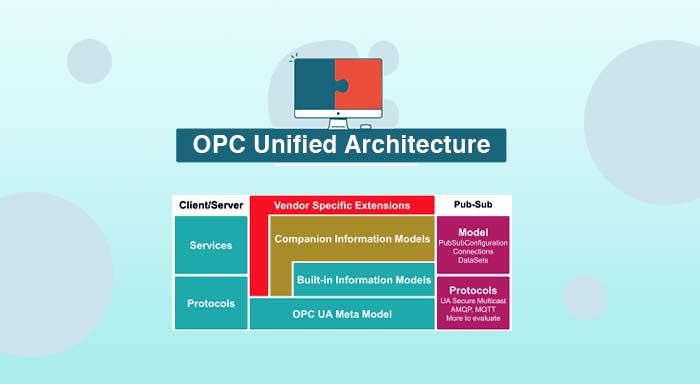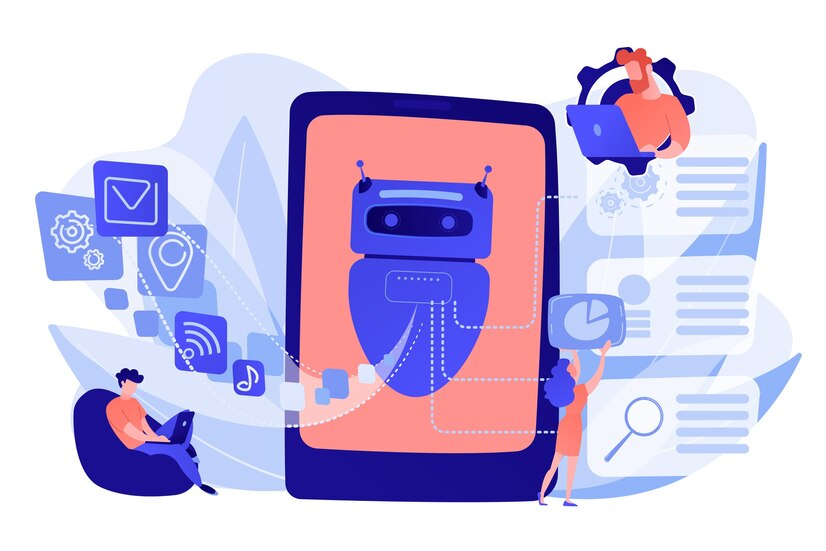Compared to a conventional 9-5 job, freelancing gives you more flexibility to manage your work throughout your day. In the majority of freelancing projects, you have the power to create your own schedule and choose the location and timing of your work hours. However, as a freelancer, one of the vital skills you need to have is time management. It is imperative to manage yourself well and ensure high levels of productivity during working hours.
To maintain this productivity, time tracking software is important. Such software can help you record how many hours you are spending on one client. They also enable you to be more efficient throughout the day and track your productive hours.
In this article, you will get a complete list of the top 8 software you can use to track time. So, without further ado, let us get started-
1. Clockify
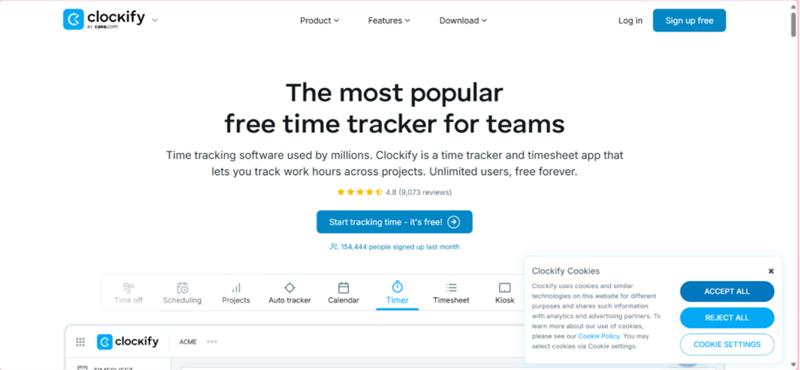
It is a popular time tracking software that allows you to track time across diverse projects and clients via a single clock. In case you forget to turn on the timer, you can choose to add manual timer later on. Clockify enables you to incorporate 80+ web apps. You can also use it as a browser extension, using that timer button within other applications as well. You can choose to set your hourly rate and then see how you are earning per project and per client.
Features
- Supports well-known project management and task management apps such as Asana, Jira, and GitHub.
- It can aid agencies and freelancers differentiate between non-billable and billable hours.
- The tool can aid you organize your freelance projects by client and task.
- You can form an overall estimate of the overall number of hours needed and track earnings and progress.
- You also have the ability to export time sheets such as CSV, Excel, or PDF files you can send to clients.
- Just with a single click, you can turn on the timer.
Advantages
- You have the flexibility to download the complete app or use it as an extension.
- It is easily integrated with prominent web applications.
- It offers offline time tracking and update details when you get reconnected to the internet.
- The tool provides an auto tracker to automatically track time across most-used applications.
Disadvantages
- You have the power to easily upgrade to Pro as well as Enterprise plans to allow capturing of screenshots and other sophisticated features.
- The overall number of reporting features is quite limited when you compare it with time tracking software.
- A few users have reported synchronization problems between the desktop and mobile apps.
- Limited number of features for automation.
2. HubStaff
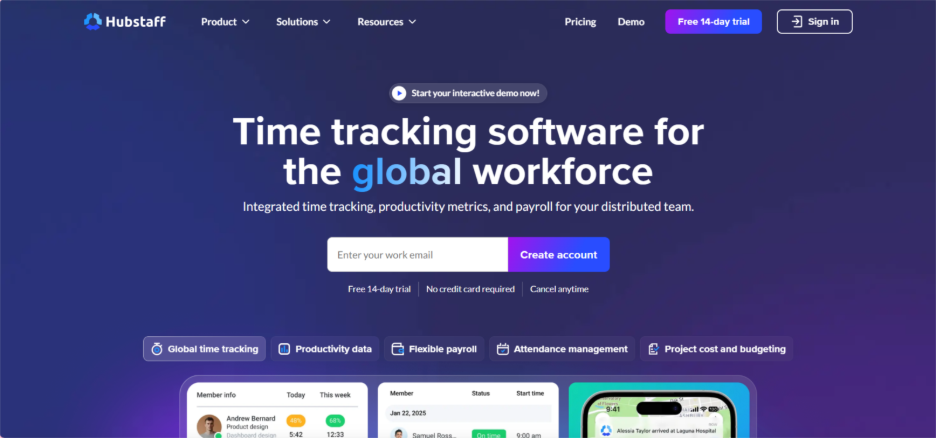
It is a well-known tool that allows teams to enhance productivity, track time, and seamlessly handle payroll. The tool is purpose-built to streamline work for both field and remote teams, allowing billing and project timelines to be more transparent.
It has emerged as one of the most preferable software for tracking time due to its features like geofencing, GPS tracking, and automated invoicing. All these features come integrated with tools like Asana and QuickBooks.
Such features make it perfect for managers and agencies handling on-site and remote tasks. Furthermore, automated reminders and app integrations provide support for productive workflows without micromanagement. Adopting automatic time tracking software eliminates manual clock-ins by detecting active applications and correlating work patterns with specific projects for effortless hour capture.
Main Features
- Geofencing and GPS tracking.
- Employee tracking (URL, screenshots, and app tracking).
- End-to-end reports and productivity analytics.
- Automated invoicing from tracked hours.
- PTO management and payroll integration.
Pros
- Smart time tracking software that works across diverse platforms.
- Automated features for payroll integration and invoicing.
- Geofencing and GPS tracking help GPS teams.
- Complete reports that streamline productivity.
Cons
- Pricing plan is a little complex as there are a lot of pricing tiers.
- Tracking features can be intrusive.
- A few users have reported GPS inconsistencies.
- Limited in-built features for management of project.
3. TogglTrack
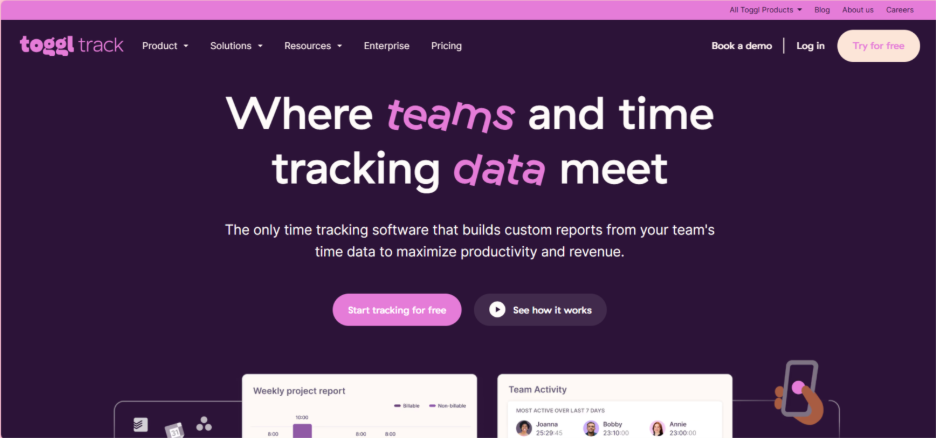
It simplifies time tracking for freelancers, teams, and agencies. Using TogglTrack, freelancers can easily record hours and track the progress of their projects. It is an effective tool for small teams requiring a simple tool with timers, manual time entries, and visual reports for effective insights on workload.
The unique aspect of this tool is its color-coded and clean interface and accessibility across platforms. It delivers valuable insights without overwhelming the users or causing complications.
Main Features
- Single-click time tracking along with a smart design.
- In-depth reports containing visual charts for the analysis of project.
- Tracking and invoicing of billable hours.
- Incorporation with project management platforms such as Trello and Asana.
- Automated and manual tracking of time simplified through browser extensions.
Advantages
- The tool is quite simple to use even for beginners.
- Comprehensive reports with visual details.
- The tool is quite flexible and works across workflows.
- Time tracking reminders that do not feel intrusive.
Disadvantages
- A few users have complained about the features for project management.
- The feature-range for management of project is quite limited.
- There are some issues associated with time synchronization as reported by a few users.
- TogglTrack does offer a free plan, but the number of features is quite limited.
4. Timely

You can accurately monitor your hours via timely, which is an AI-driven app for tracking time. The automatic time tracker of Timely operates in the background, logging your work consistently. Once you have completed your work, you can seamlessly move the “memories” in your timesheet with drag and drop features. Timely segments your overall billable hours into individual tasks so you can get a detailed overview of how you have spent your entire work week.
Core Features
- Automatic tracking of time via AI.
- The AI algorithm assesses your activities and aligns them to your clients and projects.
- This time tracking software can also provide estimates regarding time tracking requirements, timeline, and budget as per your historical data.
- The intuitive dashboard allows you to smoothly track and handle your project.
Benefits
- It enables you to allocate individual rates to your clients as well as projects.
- You can also track time via on-site projects as well as GPS meetings.
- There is also a feature that helps you log time manually.
- You can carry out a comparison between logged time and planned time for projects and tasks.
- You can create invoices via templates with customized branding.
Disadvantages
- AI training improves accuracy, which can initially make setups take a lot of time.
- There is no free plan available which is a disadvantage for agencies and freelancers with budget constraints.
- Though automated tracking is helpful, it can sometimes over-track, which then requires time-taking cleanup of unnecessary files.
- Sophisticated features can be slightly overwhelming for new users, who just desire straightforward time tracking software.
- There is also no offline mode available.
5. Insightful
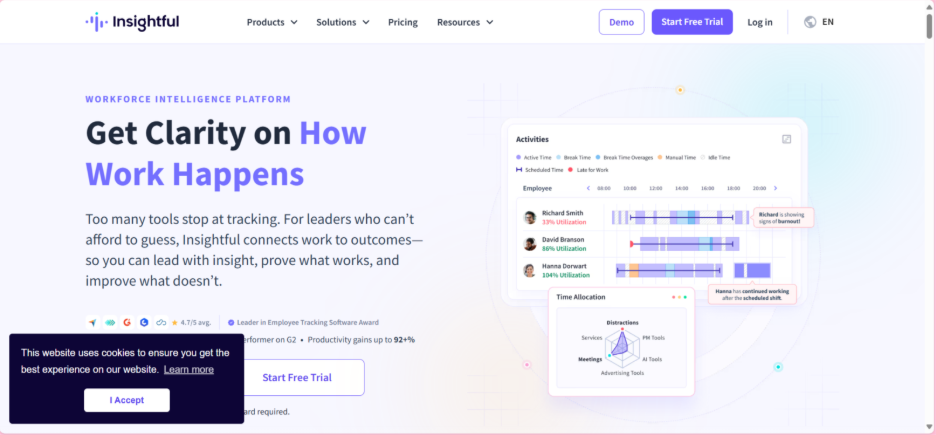
Insightful is a powerful time-tracking and employee monitoring tool specialized for hybrid and remote teams. It ensures real-time insights into the activities of employees, enabling managers to monitor productivity and recognize how the time is being spent.
It positions itself as a reliable time-tracking solution in the market as it integrates web and app tracking with offline tracking and automatic screenshots. Thus, managers in agencies as well as freelancers can get a holistic overview of the productivity hours while ensuring that the whole process remains uninterrupted.
Main Features
- Tracking of productivity with specialized labeling for specific projects and tasks.
- Greater flexibility with both automated and manual time entries.
- Consistent as well as on-demand screenshots that can be shown as work proof.
- Tracking of activity in real-time.
- Time mapping with visualization.
- Project-based budgeting as well as time tracking.
- Offline time tracking with auto synchronization whenever reconnected.
- Tracking of attendance as well as billable and non-billable hours.
Merits
- Ensures workforce analytics to track productivity.
- There are reports that show the time directly results in an increase of 10% in the total number of work hours as well as 15% accurate clock ins.
- Simple transitions between hybrid, remote, and office setups.
Demerits
- The tool might be seen as invasive because of overly intrusive tracking features.
- Stealth mode can damage trust if it is not managed well.
- There are advanced features for time-tracking, but they come in premium plans.
6. TimeDoctor
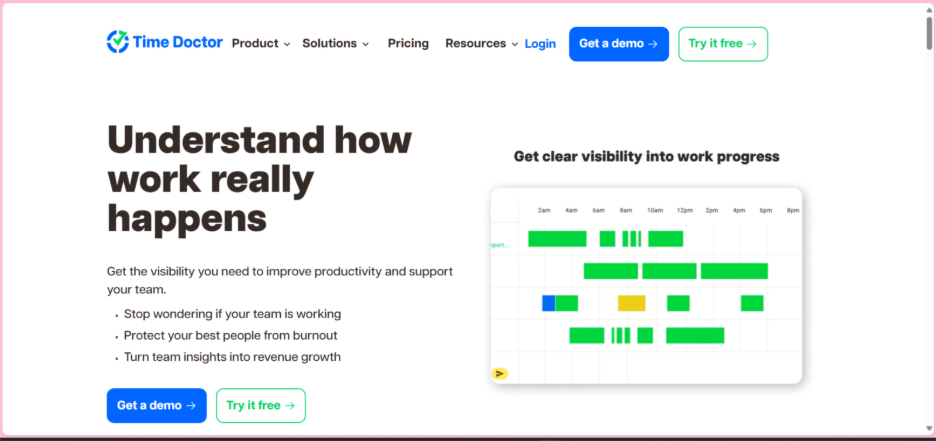
It allows remote teams, freelancers, and agencies to remain productive and accountable. This reliable time tracking software monitors overall time spent on projects, tasks, and clients. It is specialized for businesses looking to bill on an hourly basis as well as enhance efficiency and focus.
Main Features
- Time tracking for projects and tasks with stop/start options.
- Capability to capture screenshots to keep a record of progress.
- Tracks activity through keyboard and mouse tracking.
- Monitoring of app and web usage.
- Provides regular alerts related to idle time and distraction.
- It includes features for automated invoicing as well as payroll.
- Automated synchronization as well as offline tracking.
- Standard shift scheduling.
Benefits
- It provides in-depth reports for effective tracking of projects.
- Boosts accountability and reduces time-wasting.
- It automatically creates timesheets using logged time data.
Disadvantages
- The user interface could have been more intuitive.
- Though tracking features enhance accountability and transparency, they can feel more intrusive as well for the employees.
- Synchronization between mobile apps and PC can feel a little inconsistent.
7. Harvest
It is a straightforward app that lets you easily log hours and generate timesheets for clients. You can easily convert your timesheet data into visual reports so that you can monitor budget, notice the time spent, and effectively create timelines and project costs. You can directly invoice your clients via Harvest.
Core Features
- You can easily organize timers by project, client, and task.
- You can set notifications as well as custom reminders, so you do not forget your timesheets submission.
- Track non-billable as well as billable hours.
- Create invoice clients as well as timesheets.
- You can smoothly organize your projects and ensure expense tracking.
Advantages
- You can keep track of time on the mobile app when you are working in the field or in areas lacking internet access.
- Take snapshots of receipts and upload them to monitor reimbursements and expenses.
- Send invoices to clients regarding expenses.
- Ensures integration with 50+ apps.
Disadvantages
- Free plan is available, but it is suitable for one person only and supports two projects at a time.
- Web app and desktop need a robust internet connection.
- Limited options for automated tracking.
- The currently accepted payments methods are PayPal and Stripe.
8. RescueTime
It automatically logs your hours across apps, websites, and documents. RescueTime enables you to keep track of time without any manual entry or timer. Establish productivity objectives and get customized alerts on progress. It is a top-rated time tracking software that smoothly integrates with leading apps and has an in-built assistant that provides you with a consistent overview of your daily workday and gives you alerts regarding upcoming meetings.
Features
- You can switch on “Focus Time” to block any distracting websites and apps.
- AI timesheets provide automatic suggestions regarding which logs you need to add to your projects.
- Get alerts when you get distracted from your main task.
- Automatic updates on Slack Status.
Pros
- In-depth reports and actionable insights on routine habits and productivity.
- User-convenient timesheet with drag-and-drop features.
- Categorizes your work as focus, personal, and other activities.
- You get offline notifications when the system is idle. This helps you evaluate untracked time.
Cons
- RescueTime also provides features such as Focus Time and calendar integration, but they are included in the Premium Plan.
- It provides limited functions related to manual time tracking.
- AI models require historical data to enhance accuracy for timesheets and tagging.
- The platform excels in logging all online activities but does not have any features to support offline monitoring of work.
Final Note
Irrespective of whether you are working on a fixed-price or hourly project, it is essential to accurately track your time. Time tracking allows you to bill your clients correctly. With Time Tracking Software, there will be no payment discrepancy with respect to the number of hours you have worked. You can also assess your productivity and determine your hourly earning potential. Accessing insights from such tools helps you to provide accurate quotations to clients and establish realistic deadlines. There are different varieties of time-tracking tools available in the market and this blog lists out the best 8 you can explore.
Related posts:
Why Traditional Feedlot Tracking Methods Are Outdated & How Digital Tools Help
How Volunteer Tracking Software Can Improve Nonprofit Efficiency






